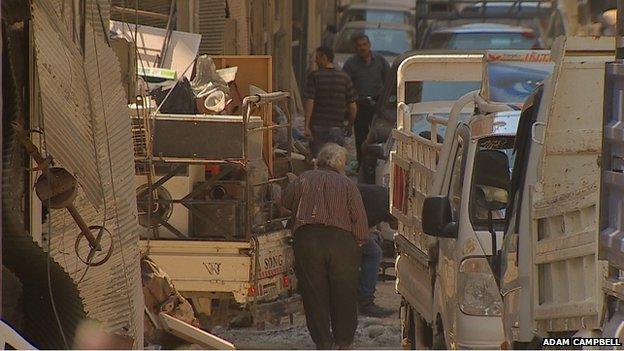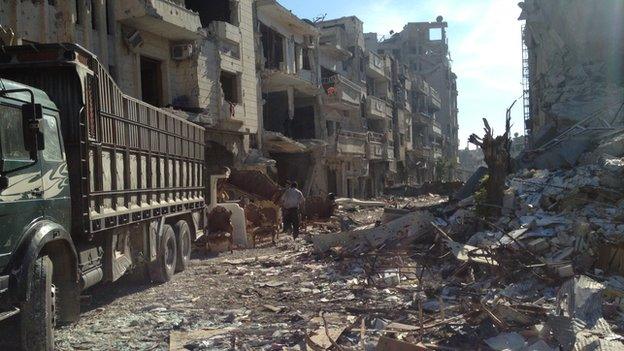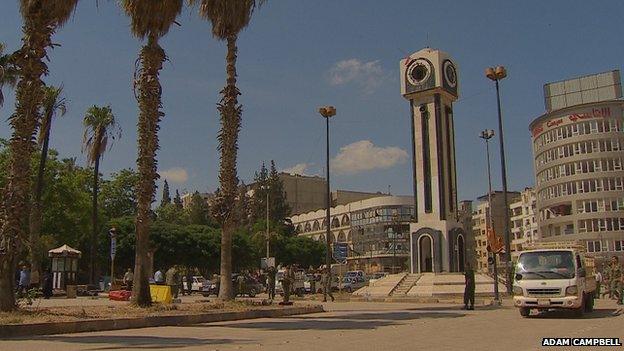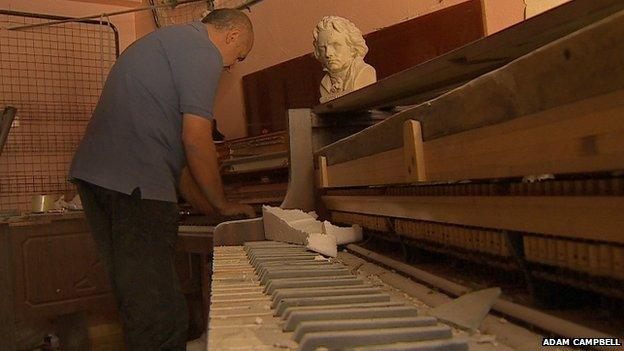Syria crisis: Rebuilding lives in the void left in Homs
- Published
The BBC's Lyse Doucet in Homs: "There's no electricity, no water here. But there's no fighting now"
It was, for many long months, one of the darkest corners of one of the worst battles of the war.
Besieged and embattled, the Old Quarter lay just beyond a desolate no-man's land around Homs's iconic new Clock Tower. The damaged edifice no longer keeps time, but it marks a defining time, still standing tall in the midst of rubble and ruin.
Only the trill of birds and rattle of gunfire once pierced this deadness.
Now this gateway is a cacophony of car horns and bicycle bells, revving of motorcycles and clatter of battered trucks streaming in and out of a shattered Old City now open to the eyes of the world.
And inside the ravaged quarter, the soundtrack is also decidedly different.

Clean-up efforts have begun in earnest in Homs as residents try to rebuild their lives
Now there's a sharp scraping of shovels clearing debris from the streets, the rumble of bulldozers, and chatter of neighbours reunited after their flight from the fighting two year ago.
Smoke rises, not from battles and bombardment, but from chunks of plaster and wood being hurled from gaping holes in buildings, as families return to clear the mess and collect their worldly goods.
Building by building, block by block, little is left.
Emotions rush in to fill the void.
"I'm scared," one man tells me as he struggles to clear a passage through the front door of his cousin's house. "This is impossible…very impossible," he sighs, gazing up at three floors without any windows or many walls.
And yet, on street after street, there's a palpable sense that people are not just trying to salvage what is left. They want to take back their lives.
"This is our house, our country. This is where we were born, and where we were raised," 20-year-old Mohammed insists as he loads sculpted bed frames into a pickup truck outside his apartment block.

Much of the city has been destroyed after more than two years of fighting
Upstairs, rooms are topsy turvy. A pack of playing cards is strewn across the floor.
"We can't live outside our country. We don't feel right unless we are in our own homes," Mohammad says, smiling to remember the memories of a life lived here.
Some blame the men who took up arms here, some blame the government whose airplanes and artillery pounded this cherished corner, and then sealed it off to starve fighters into surrender. Last week the last of the fighters left, after months of negotiations.
At some moments in these last months, the talks drew in the United Nations to help oversee the evacuation of desperate civilians and distribution of some food.
At other moments, including the final hours, it was the government's key ally Iran which played a key role in reaching a deal with the largest of the rebel groups here, the Islamic Front, which has significant backing from Saudi Arabia.
First to suffer
The story of Homs is the story of Syria.
One of the first places to see peaceful protests became one of the first to fight, and one of the first to suffer under ferocious attack.

The clock tower no longer tells the time, but still stands tall in Hom's Old Quarter
Now it's held up as the most significant local deal reached between the government and the fighters. For the government, this "reconciliation" is the way to end this war, not by wide ranging political negotiations whose failure led a second UN envoy, Lakhdar Brahimi, to resign last week.
But nearly 2,000 gunmen who held out until the end - leaving with only a personal weapon and a backpack - vowed to fight another day, in another place, and to one day return.
"They knew they had no choice but to do this, or die," an outside observer involved in the talks told me.
For now, rebels from here are exhausted and hungry. And families are desperate to focus on life, not death.
Only a handle of families remained throughout, including about 15 elderly Christians who would not leave. Now most families cannot move back immediately - there is no electricity or running water, and too much damage.
"We ask why but we don't have any answers," regrets Archbishop Selwanos Boutros who heads the Syriac Orthodox Church in Homs and Hama. "We are all to blame.
"Why Syria, why Homs, why has this happened, and where do we go with our future?" he laments as we stand inside Our Lady of the Holy Belt Church, prized for a relic said to belong to Mary, Mother of Jesus.
There's only a jagged hole where the altar once stood. The church pews were all burnt in a fire.

Amjad Manour expressed his feelings on an out-of-tune piano that survived the fighting
As we speak, faint strains of a melancholic melody float into the Church.
"We will sing, and we will light candles until we rebuild our Church," the archbishop says emphatically as a small trickle of Syrians move toward an icon punctured with black holes to light a candle and say a prayer.
How long would it take?
"A long time. It will take more than 10 years. But it is not the building. It is the people who make the church."
'Unspeakable song'
The city's Khalid ibn al-Walid Mosque is also badly damaged, with Shia slogans painted on the walls of a Sunni place of worship.
This kind of destruction and desecration are reminders that sectarian tensions still inhabit the fragile calm.
At the Harmony Music Shop, Amjad Mansour plays a haunting tune on a piano badly out of tune now - just like his country.
The floor is littered with assorted guitars and violins with broken necks.
"I came back to Syria from the United States in 2006 to start a new life here, get married and have children," he tells me. "Now I am taking my children and our memories back to the US."
"What happened here could happen again," he warns. "There is no future for me and my children here."
I ask what song he is playing. "It's a song which says I cannot speak what is in my heart."
"What happened here is a big story," he remarks bitterly. "But I cannot tell it now."
When I urge him to play another song, he hesitates in front of a new piano still in some of its packing.
Then his dust-covered fingers dance across the ivories.
A much-loved ballad fills a dark room - "Watani" - my country.
Outside, a water tanker pulls up to start providing for those who will decide they have no choice but to stay.